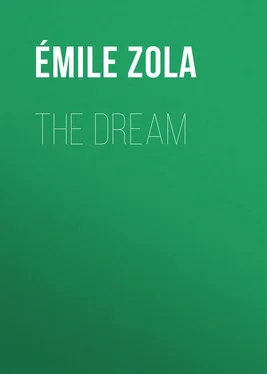Émile Zola - The Dream
Здесь есть возможность читать онлайн «Émile Zola - The Dream» — ознакомительный отрывок электронной книги совершенно бесплатно, а после прочтения отрывка купить полную версию. В некоторых случаях можно слушать аудио, скачать через торрент в формате fb2 и присутствует краткое содержание. Жанр: literature_19, foreign_antique, foreign_prose, на английском языке. Описание произведения, (предисловие) а так же отзывы посетителей доступны на портале библиотеки ЛибКат.
- Название:The Dream
- Автор:
- Жанр:
- Год:неизвестен
- ISBN:нет данных
- Рейтинг книги:3 / 5. Голосов: 1
-
Избранное:Добавить в избранное
- Отзывы:
-
Ваша оценка:
- 60
- 1
- 2
- 3
- 4
- 5
The Dream: краткое содержание, описание и аннотация
Предлагаем к чтению аннотацию, описание, краткое содержание или предисловие (зависит от того, что написал сам автор книги «The Dream»). Если вы не нашли необходимую информацию о книге — напишите в комментариях, мы постараемся отыскать её.
The Dream — читать онлайн ознакомительный отрывок
Ниже представлен текст книги, разбитый по страницам. Система сохранения места последней прочитанной страницы, позволяет с удобством читать онлайн бесплатно книгу «The Dream», без необходимости каждый раз заново искать на чём Вы остановились. Поставьте закладку, и сможете в любой момент перейти на страницу, на которой закончили чтение.
Интервал:
Закладка:
Before receiving Angelique into their family, ought not they to ascertain if she had any relatives on her side? Was her mother still alive? Had they the right to dispose of the daughter without being absolutely sure that she had willingly been given up and deserted? Then, in reality, the unknown origin of the child, which had troubled them long ago, came back to them now and made them hesitate. They were so tormented by this anxiety that they could not sleep.
Without any more talk, Hubert unexpectedly announced that he was going to Paris. Such a journey seemed like a catastrophe in his calm existence. He explained the necessity of it to Angelique, by speaking of the guardianship. He hoped to arrange everything in twenty-four hours. But once in the city, days passed; obstacles arose on every side. He spent a week there, sent from one to another, really doing nothing, and quite discouraged. In the first place, he was received very coldly at the Office of Public Assistance. The rule of the Administration is that children shall not be told of their parents until they are of age. So for two mornings in succession he was sent away from the office. He persisted, however, explained the matter to three secretaries, made himself hoarse in talking to an under-officer, who wished to counsel him that he had not official papers. The Administration were quite ignorant. A nurse had left the child there, “Angelique Marie,” without naming the mother. In despair he was about to return to Beaumont, when a new idea impelled him to return for the fourth time to the office, to see the book in which the arrival of the infant had been noted down, and in that way to have the address of the nurse. That proved quite an undertaking. But at last he succeeded, and found it was a Madame Foucart, and that in 1850 she lived on the Rue des Deux-Ecus.
Then he recommenced his hunting up and down. The end of the Rue des Deux-Ecus had been demolished, and no shopkeeper in the neighbourhood recollected ever having heard of Madame Foucart. He consulted the directory, but there was no such name. Looking at every sign as he walked along, he called on one after another, and at last, in this way, he had the good fortune to find an old woman, who exclaimed, in answer to his questions, “What! Do I know Madame Foucart? A most honourable person, but one who has had many misfortunes. She lives on the Rue de Censier, quite at the other end of Paris.” He hastened there at once.
Warned by experience, he determined now to be diplomatic. But Madame Foucart, an enormous woman, would not allow him to ask questions in the good order he had arranged them before going there. As soon as he mentioned the two names of the child, she seemed to be eager to talk, and she related its whole history in a most spiteful way. “Ah! the child was alive! Very well; she might flatter herself that she had for a mother a most famous hussy. Yes, Madame Sidonie, as she was called since she became a widow, was a woman of a good family, having, it is said, a brother who was a minister, but that did not prevent her from being very bad.” And she explained that she had made her acquaintance when she kept, on the Rue Saint-Honore, a little shop where they dealt in fruit and oil from Provence, she and her husband, when they came from Plassans, hoping to make their fortune in the city. The husband died and was buried, and soon after Madame Sidonie had a little daughter, which she sent at once to the hospital, and never after even inquired for her, as she was “a heartless woman, cold as a protest and brutal as a sheriff’s aid.” A fault can be pardoned, but not ingratitude! Was not it true that, obliged to leave her shop as she was so heavily in debt, she had been received and cared for by Madame Foucart? And when in her turn she herself had fallen into difficulties, she had never been able to obtain from Madame Sidonie, even the month’s board she owed her, nor the fifteen francs she had once lent her. To-day the “hateful thing” lived on the Rue de Faubourg-Poissonniere, where she had a little apartment of three rooms. She pretended to be a cleaner and mender of lace, but she sold a good many other things. Ah! yes! such a mother as that it was best to know nothing about!
An hour later, Hubert was walking round the house where Madame Sidonie lived. He saw through the window a woman, thin, pale, coarse-looking, wearing an old black gown, stained and greased. Never could the heart of such a person be touched by the recollection of a daughter whom she had only seen on the day of its birth. He concluded it would be best not to repeat, even to his wife, many things that he had just learned. Still he hesitated. Once more he passed by the place, and looked again. Ought not he to go in, to introduce himself, and to ask the consent of the unnatural parent? As an honest man, it was for him to judge if he had the right of cutting the tie there and for ever. Brusquely he turned his back, hurried away, and returned that evening to Beaumont.
Hubertine had just learned that the proces-verbal at Monsieur Grandsire’s, for the guardianship of the child, had been signed. And when Angelique threw herself into Hubert’s arms, he saw clearly by the look of supplication in her eyes, that she had understood the true reason of his journey.
Then he said quietly: “My child, your mother is not living.” Angelique wept, as she kissed him most affectionately. After this the subject was not referred to. She was their daughter.
At Whitsuntide, this year, the Huberts had taken Angelique with them to lunch at the ruins of the Chateau d’Hautecoeur, which overlooks the Ligneul, two leagues below Beaumont; and, after the day spent in running and laughing in the open air, the young girl still slept when, the next morning, the old house-clock struck eight.
Hubertine was obliged to go up and rap at her door.
“Ah, well! Little lazy child! We have already had our breakfast, and it is late.”
Angelique dressed herself quickly and went down to the kitchen, where she took her rolls and coffee alone. Then, when she entered the workroom, where Hubert and his wife had just seated themselves, after having arranged their frames for embroidery, she said:
“Oh! how soundly I did sleep! I had quite forgotten that we had promised to finish this chasuble for next Sunday.”
This workroom, the windows of which opened upon the garden, was a large apartment, preserved almost entirely in its original state. The two principal beams of the ceiling, and the three visible cross-beams of support, had not even been whitewashed, and they were blackened by smoke and worm-eaten, while, through the openings of the broken plaster, here and there, the laths of the inner joists could be seen. On one of the stone corbels, which supported the beams, was the date 1463, without doubt the date of the construction of the building. The chimney-piece, also in stone, broken and disjointed, had traces of its original elegance, with its slender uprights, its brackets, its frieze with a cornice, and its basket-shaped funnel terminating in a crown. On the frieze could be seen even now, as if softened by age, an ingenious attempt at sculpture, in the way of a likeness of Saint Clair, the patron of embroiderers. But this chimney was no longer used, and the fireplace had been turned into an open closet by putting shelves therein, on which were piles of designs and patterns. The room was now heated by a great bell-shaped cast-iron stove, the pipe of which, after going the whole length of the ceiling, entered an opening made expressly for it in the wall. The doors, already shaky, were of the time of Louis XIV. The original tiles of the floor were nearly all gone, and had been replaced, one by one, by those of a later style. It was nearly a hundred years since the yellow walls had been coloured, and at the top of the room they were almost of a greyish white, and, lower down, were scratched and spotted with saltpetre. Each year there was talk of repainting them, but nothing had yet been done, from a dislike of making any change.
Читать дальшеИнтервал:
Закладка:
Похожие книги на «The Dream»
Представляем Вашему вниманию похожие книги на «The Dream» списком для выбора. Мы отобрали схожую по названию и смыслу литературу в надежде предоставить читателям больше вариантов отыскать новые, интересные, ещё непрочитанные произведения.
Обсуждение, отзывы о книге «The Dream» и просто собственные мнения читателей. Оставьте ваши комментарии, напишите, что Вы думаете о произведении, его смысле или главных героях. Укажите что конкретно понравилось, а что нет, и почему Вы так считаете.












